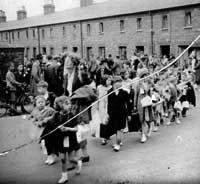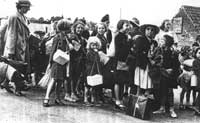The evacuees in Wolverton & New Bradwell
Memories of World War 2
During the Second World War, many families and children were evacuated out of London to towns like ‘New Bradwell’ and ‘Wolverton’. At the time, these towns were in “the countryside” and therefore were considered safe from the dangers present in London. As time marches on it is easy to forget how traumatic it must have been for the children and families that escaped the bombing:
“…had a battered suitcase and mother tied up everything in a tablecloth. ‘Felt as if I was deserting a sinking ship. I didn’t like it very much because on the one hand I wanted to get away and on the other hand I felt like a traitor or guilty because I knew that I was leaving all those behind to suffer, whereas I was sort of getting out of it.’”
A teacher called Ralph Finn who had been billeted in New Bradwell with his wife and new born baby recalled the “buzz bombs dropping on Oxford Street [in London]” He described seeing “Stretchers dripping red with blood”…The newspaper man that I used to buy my newspaper from was in about eight different parts, the newspapers still clutched in one hand.”
Memories of local residents
Many interviews were conducted by the Living Archive with people who had either been evacuated or who had received evacuees into their homes.
“True that some of the evacuees’ habits “left a lot to be desired” Bed-wetting, and “some of them never had a bath. They didn’t know what the luxury of a bathroom was”.
“Some were quite nice people really, but others were a little bit rough and ready, you know – lot came from East End, led a different life to what they did here.”
“Neighbours had some – 2 childless couples in P’s road had boys billeted onto them, who were ‘dead scruffy’ and only just about got the clothes they stood up in, and the clothes were ragged. One lot had never even had a bed to sleep on, they just slept on the floor. ‘They were really way down’. One of the women who had helped with the boy scouts, went to the Scout Hall and asked if anyone could help with clothing for the two boys they had. People provided cast-offs – which they still had at the beginning of the war…..To begin with they ‘took the war seriously’ and felt sorry for them. They’d been heaved about, and shoved about….Both families in P’s street kept their boys for the whole of the war.”
“The women were very sorry to see them go at the end of the time, and the kids very sorry to go back’…”
Clashes between Londoners and locals
Although most people were very accommodating and tried their best to help the evacuees there were inevitably, clashes between people.
“Had evacuees – straight from the hop fields-horrible smell pervaded the house. Had them for a short time. Miss L and mother didn’t keep long hours and didn’t drink a lot and apparently that’s all they seemed to do – go to pubs, leave the children in the house, go to friends and play cards and come home at 3 and 4 in the morning.”
“Londoners drank more and looked for (a) special life that wasn’t there”.
“Heard women talking in shops about evacuees, lot had their beds ruined – only to be expected – separation, strange environment,…”
“Heard women say they didn’t know what a lavatory was for, oh it was a turn up for the books. Those women really deserved a medal, keeping their patience, dealing with the extra work, cleaning up the children, getting rid of the lice and so on. It was so difficult. And they carried on valiantly.”
Plea to local people
However, Ralph Finn (mentioned above) had something to say to people who were less than tolerant of the ways of the evacuees. He worked as a teacher in New Bradwell after the school he worked at in Canning Town was “cloven completely in half”. He became so incensed that he wrote an article for the Wolverton Express entitled ‘Open Your Hearts’. In this article he accused the townspeople of neglecting the evacuees and letting them ‘roam around’. He implored them to ‘give some love’ saying “What was missing was love and affection. They had none”. He goes onto say “People in Bradwell and Wolverton were earning money while other people were getting killed. They were safe and secure, fine. In fact they were better off then they’d ever been in their lives.’….Many of the East End kids were not close to their parents – parents often didn’t bother to visit. Kids… got homesick, ….The London children were looked upon as intruders, but they made a profit out of the intrusion.”







Comments about this page
The article and comment above do not reflect New Bradwell as I remember it.
The main part of the village was north of the Grand Union Canal and the Wolverton to Newport Pagnell branch railway (later closed by Dr. Beeching), and contained the parish church, primary school. and doctor’s. The newer part of the village was south of the canal and railway, mainly lining the road to Old Bradwell with the Stanton Avenue/Althrorpe Crescent Council estate off one side and the Co-op store on the other. I cannot recall any pre-fabs anywhere in the village.
I and my two sisters, Hazel and Margaret, were evacuated to New Bradwell sometime in 1940 from Chingford, Essex. I cannot recall exactly when and I cannot remember my sisters being with me on the bus that took me to New Bradwell, but they may have been. I do recall being one of the last two boys on it when we went up Stanton Avenue – part of an estate of council houses. Our bus stopped outside one house about half way up and the lady with us said one of us was to go in that house and the other to one further up the road around the bend on the left. She asked who would like to go to which house, and I plumped (I have no idea why) for the unseen house up the road – I think it was 45. I could not have chosen better. I believe that some years later that part of Stanton Avenue was renamed as part of Althorpe Crescent.
I was billeted with Mr. & Mrs. Hale (Fred & Pru); they were an older couple and had two teenage children – Effie (who worked at Bletchley Park) and Frank who joined the Merchant Navy as a radio operator after attending the wireless training college in Colwyn Bay.
Mr. Hale worked at Wolverton railway works. I stayed with them for about two years until I won a scholarship to grammar school and returned to Chingford in autumn 1942. They were a lovely family and I remained in to touch with them until the 1960s when Mr. & Mrs. Hale had both died. I could not have chosen a better billet. Effie married, but died not long after from acute asthma. Frank married later and I was a witness to his wedding.
Whilst we were in New Bradwell the Luftwaffe,in a badly aimed attack on the railway works in Wolverton, managed to drop a bomb at the end of the village school and it was closed for some time. The same bomb threw a kerbstone into the air which dropped on to the house in the village where my sister Hazel was billeted and landed in her bedroom. Only that morning had her bed been moved from that side of the bedroom to the other, so she was found safely fast asleep with her bed covered in dust and small debris.
I was a choirboy at New Bradwell church and we had a somewhat eccentric priest named Father Guest who lived in the large rectory/vicarage south of the village on the Old Bradwell road. I used to visit the old church in a field at Stantonlow which was almost derelict. I was also involved in a youth club in the village, but have forgotten the details.
I was an evacuee to Wolverton in 1939 aged 4years together with my 6 year old brother from the East End of London. I have always felt gratitude towards Wolverton for their hospitality and the wonderful family who gave me so much love during my formative years. Wolverton gave me the happiest days of my childhood.
My mum and dad where evacuated to Bradwell or Wolverton in WW2 as mum was expecting me.I can remember them having a hard time finding anywhere to live although there where lots of council houses and Prefabs in Bradwell they couldn’t get one, and ended up living in a house belonging to Gurneys over the fields from Stanton Avenue. When I was three dad had to get a job at the Works so as to get a railway house in Loughton where grew up until I was 15. Then they got a council house at Stoke Goldington when I was 18. I would have loved to have grown up in Bradwell as there was much more for kids to do. Loughton was dead with only one girl my age and no Merry Comrades or anything, ! 1950s
Add a comment about this page